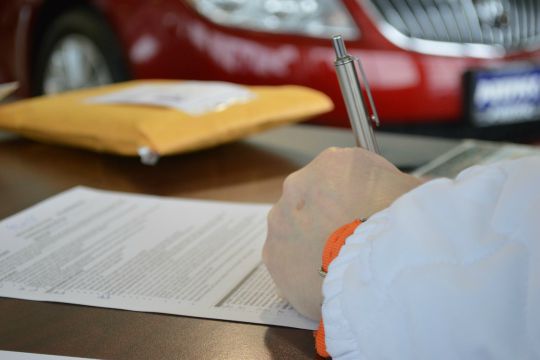Loans of all types, from personal to payday, follow similar rules and patterns. If you are thinking about getting a loan of any kind, it’s important to consider every pro and con. With this list, you should be able to tell, definitively, whether the time is right for you to take out a loan.
How Loans Work: The Basic Loan Process

Loans are a pretty simple concept with just three steps from application to acquisition to pay back.
The Loan Application Process
Applying for a loan, and being accepted, depends on the loan type you are applying for. Personal loans require no down payment or collateral but usually do require a high credit score. Payday loans may only need proof of employment. To get the best rates, make sure to shop around.
1. Using Your Money
Whatever you needed funding for, once your application has been accepted your funds are yours to use (minus any applicable fees and typically the first payment.)
2. Paying Back the Loan
Loans are paid back in monthly or weekly installments until you have paid back the entirety of what was borrowed in addition to all accrued interest.
Important Pros of Getting a Loan
1. Sliding Scale of Acceptance – Nearly anyone with a job can get a loan of some kind.
2. More Time to Make Ends Meet – The funds from a loan may be available in as little as a few hours and can be a lifesaver in emergency situations. It can also be used to fund essential causes at a moment’s notice.
3. Diversifies Your Credit Portfolio – A strong credit portfolio is determined by the types of credit you have been offered as well as the total amount you have access to.
Notable Cons of Getting a Loan
1. Taking on Too Much Debt – Debt can be a vicious cycle. What starts with student loans can snowball into credit card debt and a lack of realistic financial boundaries. Falling behind on your loan payments can even result in losing your job.
2. Loans Can Lead to Excessive Spending – When it’s easy to get a loan that you don’t need, it can be easy to take on too much debt and the only thing preventing disaster is your own financial knowledge and self-control.
3. The Interest – Interest can vary from loan to loan. The higher your APR, the more you end up paying to borrow money. Further, fixed-rate loans have the same interest rate over time while anything with an “adjustable” rate may change.
4. Early Repayment Fees – If possible, you want to find a loan that lets you pay it back early with no penalty. Why would you want to pay a loan back early? To save on accrued interest. While some loans may make you pay back a minimum level of interest no matter when you pay up, others will allow you to settle your balance for much less.
5. Emotional Instability – Yes, loans can be used to help out when you are in a tight spot. However, if you aren’t already in a solid financial position overall, taking on debt may lead to depression, decreased self-control, or other adverse psychological consequences.
How to Use Your Money Once You Have a Loan?
MoneyCards and Debit Cards
While just about everyone with a bank account has a debit card, not everyone knows about “MoneyCards”. MoneyCards allow you to pay for whatever you need like a debit card and can be reloaded with a specific amount. Many also come with additional budgeting features. You can buy these at local department stores and payday loan centers or you can click here to find MoneyCards in Los Angeles.
Cash and Checks
If you would like, you can withdraw and use the loan amount in its cash form. (Though this is impractical with larger loans.) Checks may also be used as usual.
Bank Transfers
Bank transfers allow you to easily transfer money, for a minimal fee, in order to make payments.
Credit Cards
Paying off the balance of your credit cards with a personal loan may not be a bad move, considering that loans typically have a smaller interest rate. However, make sure that you aren’t tempted to overspend and go into debt.
Read Also: 20 Types of Small Business Loans Can Help your Startup in Trouble
Author Bio: Evelyn Lopez















